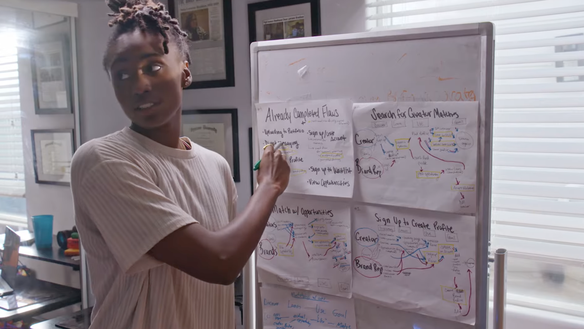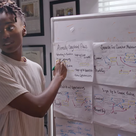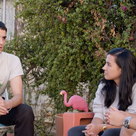Transcript
Elle Mills: Hey guys. Welcome to Career Day, brought to you by Square.
Charlie Chang: We're talking with Gen Z entrepreneurs to learn how they bet on themselves and start their own business.
Elle Mills: I'm super excited about today's episode. We're going to be talking to Sam Rosenthal, CEO, and founder of the Game Band, and today he's going to be teaching us how to transition from the corporate world to startup, how to lead with good values and the importance of finding a mentor.
Charlie Chang: Thank you so much to Square for sponsoring the series and for giving small businesses the tools they need to thrive. Let's go talk to Sam.
Elle Mills: Sam is a USC graduate with a degree in game design. He was named one of Forbes 30 under 30 in 2020 for his work as the founder of the game band. He launched several successful games including Blaze Ball and Work Cards fall with support from a full team of employees and investors, Sam hopes to develop games that focus on storytelling. He's taken every opportunity to follow the road less traveled.
Charlie Chang: Thank you so much for having us. I think we're really excited to hear your story. Can you tell us what the game band is and sort of what your role is in the company? Sure.
Sam Rosenthal: So the Game Band is a studio that's dedicated to pushing the boundaries of interactive storytelling. We've made two games so far. The very first one was called Wear Cards Ball. It's out on Apple Arcade and Switch and pc and the second one is called baseball. It's this absurdist hard fantasy baseball game. I'm the founder and the CEO that my role was split between the creative direction and the business strategy of the company.
Charlie Chang: Before you did this company, what were you doing before?
Sam Rosenthal: I worked at a number of different game companies. I first started my career actually working on children's franchises, and then I went and worked on this more cerebral interactive story game called What Remains of Edith Finch. And I met great people along the way at all those different companies and I'm fortunate to still be working with them today.
Charlie Chang: It seems like you had a lot of good stuff going on before you started your company. What ultimately made you decide, hey, I'm going to leave my job and do my own thing, and what was that whole experience like
Sam Rosenthal: Leaving my job? It was scary. I can't imagine it not being scary for anybody. I was both very excited to finally have an opportunity to do so and also completely unprepared for what was to come. When you're at a job, when you're working at a company, it's not just like the cushiness of a steady paycheck, it's also like the cushiness of being told what you're supposed to be doing and getting feedback on what you're doing. And when you're off on your own, it's up to you to set your priorities and to make sure that just the business is functioning at a core level. I think the toughest thing was just getting out of the mindset of, oh, it's just going to be this freeform creative process, and then to the, oh, I actually need to learn how to manage a company and manage myself as part of that company too. A lot of the things they don't tell you when you're about to start a company, especially if it's like entertainment focused company, is that there's a lot of logistical, not super interesting things that all of a sudden you're responsible for. I had to figure out how we're going to run payroll the very first week that we started a company, but all of those different types of things are, they're not told as these are going to be the responsibilities of a creative director, but they are the responsibilities of a CEO in virtually all forms.
Elle Mills: So was there ever a moment where you felt like, I don't know, maybe I should give up? Or was it always like, I really do believe in this and I'm going to stay persistent because I'm going to make it happen?
Sam Rosenthal: To be honest, I never thought about giving up. I always, always wanted to do this, and part of it was I just genuinely believed that and still believe that there's so much opportunity in games and so many games that don't exist that should exist. And I felt like a lot of the ideas that me and my friends have or in that space and that belief has gotten me through a lot of really rough patches when you don't know if you're going to make it or if the company is going to survive. Ultimately it kind of comes back down to belief in yourself. And yeah, I've had a lot of nights where I've just had to kind of push forward and go back to what that original vision was.
Elle Mills: What would you say to aspiring entrepreneurs who are probably in that same position of experiencing failure after failure? What advice would you give them?
Sam Rosenthal: I mean, every success story that I've ever heard is a story of persistence. I would say if you truly believe that your work needs to get out there in the world, and it probably does, think about what your strengths are and what makes you unique rather than what your weaknesses are and focus on those and they'll get you through a lot of different projections.
Charlie Chang: How do you monetize your games?
Sam Rosenthal: When monetizing a game, you really have to think about how the game is designed for a game like our first game where card spa, which had a beginning, a middle, and an end. That's a more natural fit to sell at a fixed cost. We might sell it for $20 on a digital storefront for baseball. Our second game, that's a game that is live. It is growing, it's changing over time, and it's free. We want people to be able to access it without any pricing barriers. So free games have gone a lot of different ways with monetization, and we're thinking a lot right now about how we can monetize baseball in an ethical way. What you're looking for is a way to ultimately get enough of your audience invest in the game and want to spend and feel like they're getting something valuable out of it and not just like they're, and not to feel taken advantage of.
Charlie Chang: During the course of your company's journey, has there been a time where you guys haven't had enough money to make a game or gone through some monetary struggles?
Sam Rosenthal: So one of my mentors gave me some great advice. He said, you have a great team. Why don't you stop chasing money and make a game? And that was where a baseball originally came from. We made this game that was supposed to bring people together during this really isolated time, and the game blew up pretty quickly and mostly went viral on Twitter, and we were really fortunate to get this great fan base and then had found a way to make it sustainable. So that was when I went out and I fundraised and raised our seed round from VCs and the day before that money hit our bank account, we had $10,000 left in the bank, which was enough for maybe one more payroll. So we were really at the razor's edge.
Elle Mills: So what are your future financial goals with the game band?
Sam Rosenthal: Ultimately I want us to make enough money to be able to make really great, interesting, weird experimental projects without any fear, and I want to be able to take care of our people. I think it's really as simple as that. I didn't get into this to become a billionaire or anything like that. I just want to be able to make great things.
Elle Mills: Working with Sam over the past couple of years, how has it been seeing his growth as a CEO?
Stephen Bell: There are always new challenges and I've seen Sam kind of continue to grow with the team and with the same kind of values that founded the game band. Ones of innovation, experimentation, but also transparency, empowerment, collaboration. Sam has done all that while also fundraising and scaling a team, and that's a huge challenge.
Charlie Chang: Sam, it seems like you're an amazing leader that has taken this company really far along this journey. Did you have anyone sort of guiding you or helping you out?
Sam Rosenthal: Oh, so many people have helped me out along the way. It definitely has not just been my own intuition here. It's been a wide range of people from performer, professors of mine to other game company founders, to other startup founders, to friends, family, my partner. I usually am looking to understand whenever I'm faced with a problem that I've never faced before, which happens a lot, what have other people done in similar situations, it's never going to be the exact same situation because your problems as an entrepreneur are usually uniquely your own since every company is different. But if there's enough similarities, you can at least see what the ground, what kind of ground was, try to before and try to just avoid as many pitfalls as you possibly can.
Charlie Chang: So for a new entrepreneur that is just starting out, would you tell them that mentorship is something they should actively pursue? And how would they go about finding someone like that?
Sam Rosenthal: I don't think you need to focus on having an official mentor as long as you have people that you trust and you are comfortable being vulnerable with. I think being able to say, I don't know, and ask for help is one of the most important skills to develop as an entrepreneur. It's really easy to tell when you're faking it and so many times you're going to be faced with things that you just have no idea how to handle. If you're not able to go and ask people what to do, then you're going to end up having to learn a lot of these lessons the hard way, which you do not want to do.
Stephen Bell: We've seen that happen from people who are even just volunteers on the team suddenly throwing out an idea that ended up as a feature in the game. And it's because we've continued to foster a sense of security, empowerment and collaboration where no one is afraid because they haven't had enough experience to be able to toss out an idea.
Sam Rosenthal: Entrepreneurs love this stuff. If you are asking another entrepreneur for help, they're probably just the way that most entrepreneurs' brains work is they get really excited and interested in whatever problems you're facing and then want to help you solve them. And the more that you ask for help, it's just like the more that you get rejected, the easier it is to get rejected. The more you ask for help, the easier it is to just turn to people again too.
Charlie Chang: You guys have been super inspirational. Thanks so much for your time.
Sam Rosenthal: Thanks so much.
Charlie Chang: Thanks again to the game band, CEO Sam, for all the knowledge he shared about how he transition from the corporate life to doing startups, how to lead good values, as well as the importance of finding a good mentor.
Elle Mills: Be sure to check out Square's website where they provide all the tips and info you need, including how to start a free online store.
Charlie Chang: And be sure to subscribe for more career episodes and remember, always bet on yourself.
Elle Mills: Thanks guys. Bye. Hello, how are you? Nice to meet you. Lemme do it again.






